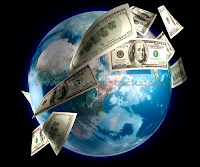Trade
Trade is the voluntary exchange of goods, services, or both. Trade is also called commerce or transaction. A mechanism that allows trade is called a market. The original form of trade was barter, the direct exchange of goods and services. Later one side of the barter were the metals, precious metals (poles, coins), bill, paper money. Modern traders instead generally negotiate through a medium of exchange, such as money. As a result, buying can be separated from selling, or earning. The invention of money (and later credit, paper money and non-physical money) greatly simplified and promoted trade. Trade between two traders is called bilateral trade, while trade between more than two traders is called multilateral trade.
Trade exists for man due to specialization and division of labor, most people concentrate on a small aspect of production, trading for other products. Trade exists between regions because different regions have a comparative advantage in the production of some tradable commodity, or because different regions' size allows for the benefits of mass production. As such, trade at market prices between locations benefits both locations.
Trading can also refer to the action performed by traders and other market agents in the financial markets.
Trade exists for man due to specialization and division of labor, most people concentrate on a small aspect of production, trading for other products. Trade exists between regions because different regions have a comparative advantage in the production of some tradable commodity, or because different regions' size allows for the benefits of mass production. As such, trade at market prices between locations benefits both locations.
Trading can also refer to the action performed by traders and other market agents in the financial markets.
Development of money
The first instances of money were objects with intrinsic value. This is called commodity money and includes any commonly-available commodity that has intrinsic value; historical examples include pigs, rare seashells, whale's teeth, and (often) cattle. In medieval Iraq, bread was used as an early form of money. In Mexico under Montezuma cocoa beans were money.
Currency was introduced as a standardised money to facilitate a wider exchange of goods and services. This first stage of currency, where metals were used to represent stored value, and symbols to represent commodities, formed the basis of trade in the Fertile Crescent for over 1500 years.
Numismatists have examples of coins from the earliest large-scale societies, although these were initially unmarked lumps of precious metal.
Ancient Sparta minted coins from iron to discourage its citizens from engaging in foreign trade.
International trade
International trade is exchange of capital, goods, and services across international borders or territories. It refers to exports of goods and services by a firm to a foreign-based buyer (importer) In most countries, it represents a significant share of gross domestic product (GDP). While international trade has been present throughout much of history (see Silk Road, Amber Road), its economic, social, and political importance has been on the rise in recent centuries.
Industrialization, advanced transportation, globalization, multinational corporations, and outsourcing are all having a major impact on the international trade system. Increasing international trade is crucial to the continuance of globalization. International trade is a major source of economic revenue for any nation that is considered a world power. Without international trade, nations would be limited to the goods and services produced within their own borders.
International trade is in principle not different from domestic trade as the motivation and the behavior of parties involved in a trade do not change fundamentally regardless of whether trade is across a border or not. The main difference is that international trade is typically more costly than domestic trade. The reason is that a border typically imposes additional costs such as tariffs, time costs due to border delays and costs associated with country differences such as language, the legal system or culture.
Another difference between domestic and international trade is that factors of production such as capital and labor are typically more mobile within a country than across countries. Thus international trade is mostly restricted to trade in goods and services, and only to a lesser extent to trade in capital, labor or other factors of production. Then trade in goods and services can serve as a substitute for trade in factors of production. Instead of importing a factor of production, a country can import goods that make intensive use of the factor of production and are thus embodying the respective factor. An example is the import of labor-intensive goods by the United States from China. Instead of importing Chinese labor the United States is importing goods from China that were produced with Chinese labor.
International trade is also a branch of economics, which, together with international finance, forms the larger branch of international economics.
The first instances of money were objects with intrinsic value. This is called commodity money and includes any commonly-available commodity that has intrinsic value; historical examples include pigs, rare seashells, whale's teeth, and (often) cattle. In medieval Iraq, bread was used as an early form of money. In Mexico under Montezuma cocoa beans were money.
Currency was introduced as a standardised money to facilitate a wider exchange of goods and services. This first stage of currency, where metals were used to represent stored value, and symbols to represent commodities, formed the basis of trade in the Fertile Crescent for over 1500 years.
Numismatists have examples of coins from the earliest large-scale societies, although these were initially unmarked lumps of precious metal.
Ancient Sparta minted coins from iron to discourage its citizens from engaging in foreign trade.
International trade
International trade is exchange of capital, goods, and services across international borders or territories. It refers to exports of goods and services by a firm to a foreign-based buyer (importer) In most countries, it represents a significant share of gross domestic product (GDP). While international trade has been present throughout much of history (see Silk Road, Amber Road), its economic, social, and political importance has been on the rise in recent centuries.
Industrialization, advanced transportation, globalization, multinational corporations, and outsourcing are all having a major impact on the international trade system. Increasing international trade is crucial to the continuance of globalization. International trade is a major source of economic revenue for any nation that is considered a world power. Without international trade, nations would be limited to the goods and services produced within their own borders.
International trade is in principle not different from domestic trade as the motivation and the behavior of parties involved in a trade do not change fundamentally regardless of whether trade is across a border or not. The main difference is that international trade is typically more costly than domestic trade. The reason is that a border typically imposes additional costs such as tariffs, time costs due to border delays and costs associated with country differences such as language, the legal system or culture.
Another difference between domestic and international trade is that factors of production such as capital and labor are typically more mobile within a country than across countries. Thus international trade is mostly restricted to trade in goods and services, and only to a lesser extent to trade in capital, labor or other factors of production. Then trade in goods and services can serve as a substitute for trade in factors of production. Instead of importing a factor of production, a country can import goods that make intensive use of the factor of production and are thus embodying the respective factor. An example is the import of labor-intensive goods by the United States from China. Instead of importing Chinese labor the United States is importing goods from China that were produced with Chinese labor.
International trade is also a branch of economics, which, together with international finance, forms the larger branch of international economics.










